CNBC/Change Research Poll in Arizona, Florida, Michigan, North Carolina, Pennsylvania, and Wisconsin: May 29-31, 2020
Key Takeaways
- Biden is leading by 7 points nationally, and now leads across the 6-state battleground.
- 63% of battleground voters and 69% nationally remain seriously concerned about COVID-19 and just 37% nationally say things are getting better.
- Majorities now say it is safe to go to a public beach (57%), work at their workplace (57%), and go to a salon (52%), other activities like students going to school and taking public transportation remain unsafe.
- Only 29% nationally believe things are not reopening quickly enough, and 59% say that if there are increased hospitalizations, then we need to increase precautions rather than accept this as the cost of reopening and continue to relax restrictions.
- 75% of voters nationally and 71% in the battleground rate the economy negatively, but some national and personal economic metrics are starting to rebound as things reopen.
Biden is making gains nationally and in the battleground states
Joe Biden has a 7-point lead over Donald Trump nationally (48% Biden, 41% Trump). That is up from his 3-point lead two weeks ago and his greatest lead to date. Across the six battleground states Trump won in 2016, Biden now leads by 1 point (47% Biden, 46% Trump). This is a 3 point shift in the margin since our last wave and the first time Biden has led. Biden and Trump are at parity in Arizona (+1 Trump), North Carolina (+1 Biden), and Wisconsin (even), Biden leads in Florida (+3) and Michigan (+2), and Trump leads in Pennsylvania (+4).
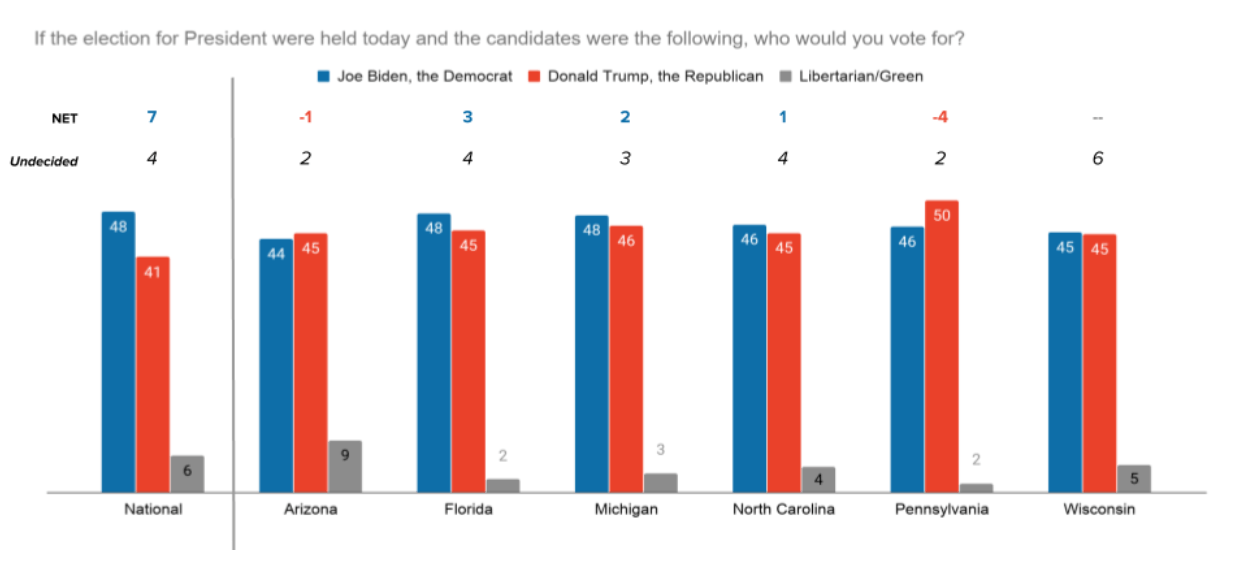
There is still room for Biden to consolidate the anti-Trump vote and improve his margins further: 66% of those who are currently undecided or voting third party in the battleground disapprove of Trump and 48% disapprove strongly.
Trump’s job performance is net-negative nationally (+12 unfavorable) as well as in the key states of Florida (+7 unfavorable), Michigan (+4 unfavorable), North Carolina (+3 unfavorable), and Wisconsin (+3 unfavorable). His approval is only 51% in Arizona and 52% in Pennsylvania. In every state strong disapproval outpaces strong approval.
Voters still seriously concerned about COVID-19 even as country reopens
Voters remain split over the impact of the coronavirus, with 42% nationally saying things are getting worse, 37% saying they are getting better and 21% unsure. This is stable from 2 weeks ago (35% getting better, 43% getting worse, 22% unsure). There is more movement when you look at the individual battleground states. In Arizona, there was a 7-point decrease in people saying things are getting better over the past two weeks (37% getting better this week), which tracks with the upswing in cases there. There was a 5-point increase in those saying things are getting better in Michigan (48% better this week) and a 6 point increase in Pennsylvania (44% better this week).
Nationally, 69% remain concerned and 45% very seriously concerned about the coronavirus. Across the battleground, 63% of voters remain seriously concerned about the coronavirus and 40% very seriously concerned. In a forced choice about their immediate concerns, battleground voters continue to prioritize the impact of COVID on health and safety over the impact on finances at both the personal level (65% to 35%) and the national level (56% to 44%), as they have since early May.
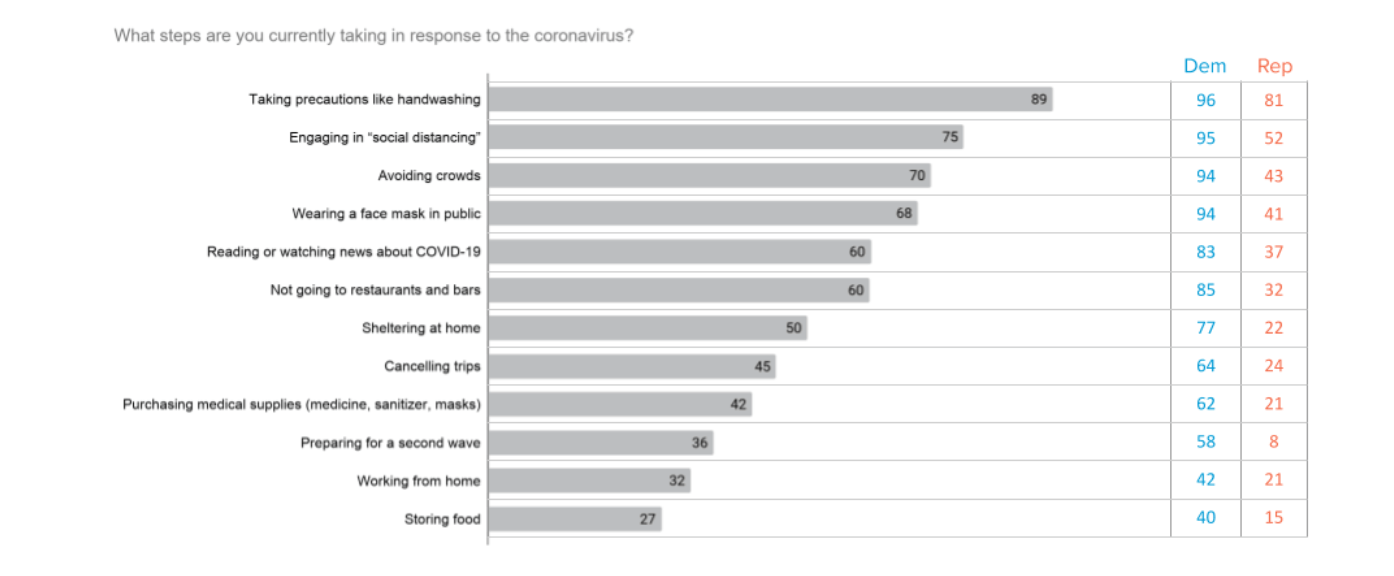
Even as states start to loosen restrictions and people engage in protests across the country, majorities are still taking precautions in response to the outbreak such as washing their hands (89%), social distancing (75%), avoiding crowds (70%), wearing a mask in public (68%), not going to bars and restaurants (60%), and sheltering at home (50%). These responses are driven by Democrats and independents. Republicans are far less likely to participate in precautions.
Two-thirds of voters nationally and a 58% majority of battleground voters are favorable towards those who wear masks in public, while the majority are unfavorable towards people protesting stay-at-home orders (52% unfavorable in the battleground, 59% unfavorable nationally). Republicans again are in a very different place than Democrats and independents on these groups of people.

The re-opening debate
The majority of voters nationally and in every battleground state except for Michigan and Pennsylvania believe that their state is either opening too quickly (32% nationally) or at the right pace (39%). In Michigan and in Pennsylvania, small majorities believe that things are not opening quickly enough. (For context, the Michigan stay at home orders were still in place when this fielded and all Pennsylvania will not lift stay-at-home orders for all counties until June 5th.)
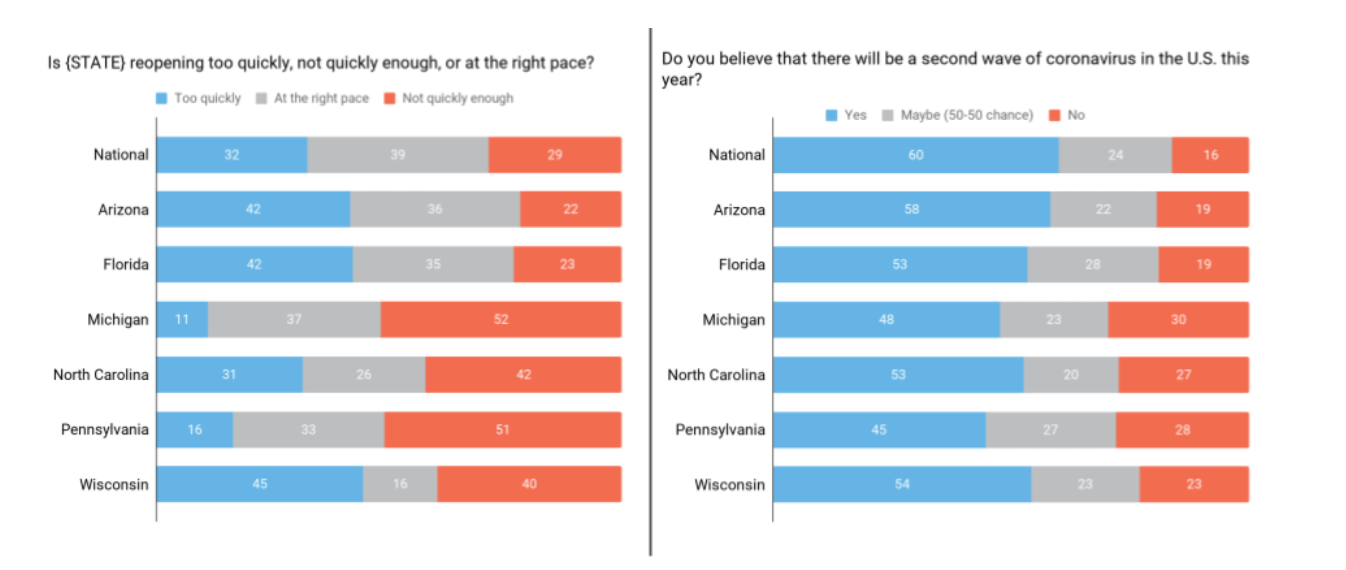
Thinking about reopening and the threat of a coronavirus resurgence, six-in-ten voters nationally and majorities in Arizona (58%), Florida (53%), North Carolina (53%), and Wisconsin (54%) believe that a second wave of coronavirus is likely to occur within the next year. Only 16% nationally say this is unlikely to happen. Michigan and Pennsylvania are the only two states in the battleground where fewer than half say a second wave is likely, but only 30% of those in Michigan and 28% of those in Pennsylvania say a second wave is not likely to happen this year.
If hospitalizations due to COVID-19 begin to increase again as states reopen, voters nationally and across the battleground say “this is a sign that we need to increase precautions again” rather than “this is just a reasonable cost of returning to normal and we should continue to relax restrictions.”
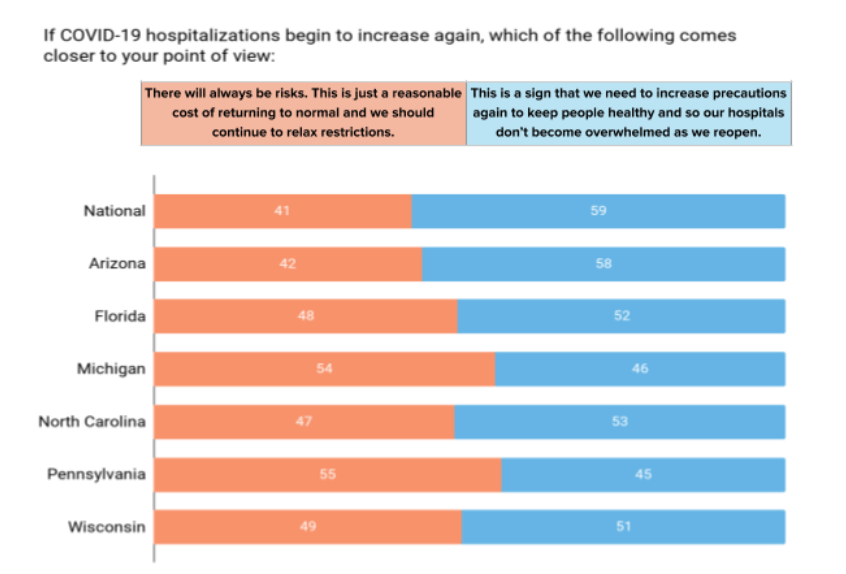
Some voters still need the assurance of effective treatment or vaccines to feel completely safe
A majority of voters believe that is it safe to go shopping (63%) – something that people were still able to do under stay-at-home orders, go to a public beach (57%), go to work at their workplace (57%), and go to a hair or nail salon (52%). Half think it is safe to stay in a hotel. While there were 5 to 10 point increases in the numbers saying various activities were safe over the past month, fewer than half believe it is currently safe to engage in every other activity tested. Voters were especially unlikely to say it is safe to attend a large sporting event, use public transportation, take a flight, go to a movie theatre, or go to a bar.
There is an important partisan split over what is currently safe. Fewer than half of Democrats think it is safe to engage in any of these activities. Majorities of Republican believe it is safe to engage in every activity tested.
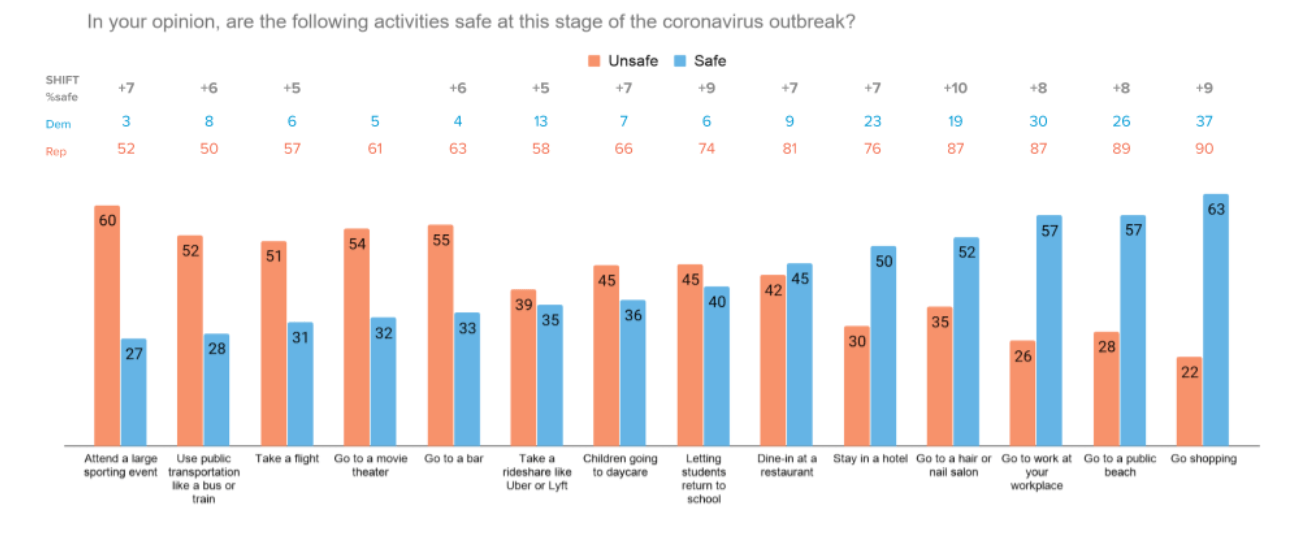
When we asked voters who did not say it was currently safe to take a flight, only 35% said it would be safe if they had access to rapid COVID-19 testing. Two-thirds said it would be safe if there were an effective COVID-19 treatment or a vaccine. Only 31% of those who do not currently feel safe taking public transportation say they would feel safe if they had access to rapid testing; that rises to 62% if there is an effective treatment or vaccine. Access to rapid testing would be sufficient for people who don’t think it is safe to attend a large sporting event to feel safe, but 54% would feel safe if there was an effective treatment and 60% would feel safe if there was a vaccine.
Notably there is still reluctance to do some of these things even if there was a vaccine. There may be doubts about the effectiveness of a rapidly developed vaccine or concerns about the ability to ensure widespread access. With that in mind, only half of voters now say that they are likely to get a COVID-19 vaccine when one becomes available. Presently, there are major differences by vote choice with 65% of Trump voters saying they are unlikely to get a vaccine and 78% of Biden voters saying that they are likely to get one.
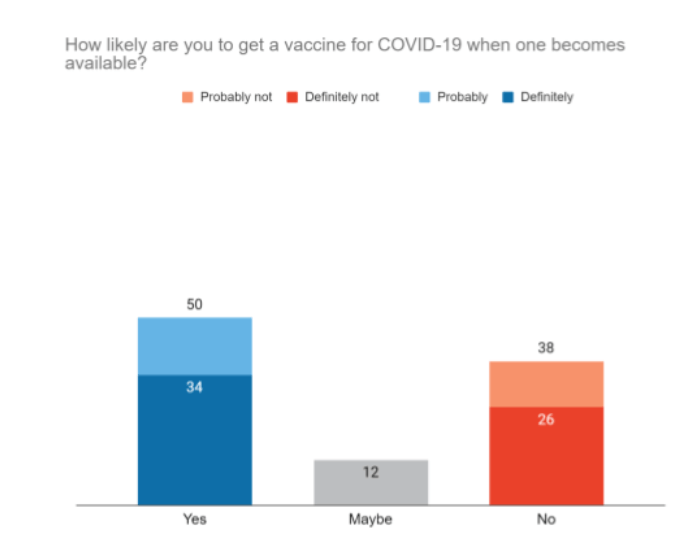
Economic metrics remain negative but begin to rebound as states reopen
The current state of the U.S. economy is rated negatively by 75% of voters nationally and 71% of voters in the battleground. That is a very different picture from our first surveys in early March when only 47% nationally and 43% in the battleground rated the U.S. economy negatively. Still, compared to two weeks ago, views are now 5 points more positive nationally and 7 points more positive in the battleground.
We see other evidence of the economic devastation beginning to subside for the first time in our polling this week. A large 65% majority nationally and in the battleground say we are currently in a recession, but 72% nationally and 69% in the battleground felt that was true two weeks ago. Fewer voters are reporting having lost jobs or wages or having lost a job or been furloughed due to COVID-19 compared to mid-April.

To be sure, the pain is still deep and widespread, and people of color, women, and low-wage workers are more likely to both suffer from COVID-19 and to suffer economically. We are also seeing a significant increase in the number reporting that they are experiencing higher prices for goods in stores and online: 71% in the battleground say they are currently experiencing an increase, up from 61% two weeks ago and 33% in early March.
When asked if they would prefer to extend the $600 unemployment bonus or have a one-time $450 dollar return-to-work bonus, voters in the battleground states were clear that the extended unemployment benefit would be the best thing to help people who have lost their job due to COVID-19, preferring it by a 20-point margin (60% to 40%).
Battleground Sample & Methodology
National Companion Survey Toplines
National Companion Survey Sample & Methodology
For media inquiries, please email [email protected]
Change Research conducted a poll of 3,958 likely voters May 29-31, 2020 across 6 competitive battleground states: Arizona, Florida, Michigan, North Carolina, Pennsylvania, and Wisconsin. A companion national survey of 1,457 likely voters was also conducted May 29-31, 2020. Unless otherwise stated, the results presented in this analysis are among battleground state voters. The margin of error, as traditionally calculated, is ±1.56% for the battleground and ±2.57% for the national poll. Change Research reaches voters via targeted online ads that point people to an online survey instrument. Our Dynamic Online Sampling establishes and continuously rebalances advertising targets across region, age, gender, race, and partisanship to dynamically deliver large samples that accurately reflect the demographics of a population. Post stratification was done on state, gender, age, race, education, and 2016 presidential vote.
This is the sixth in a series of bi-monthly battleground state and national surveys that CNBC & Change Research will conduct in 2020.
